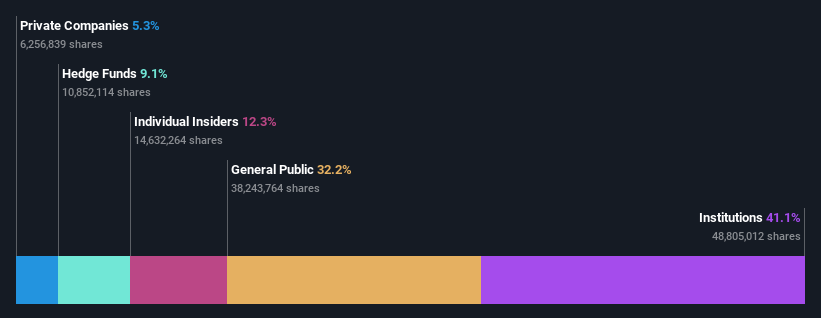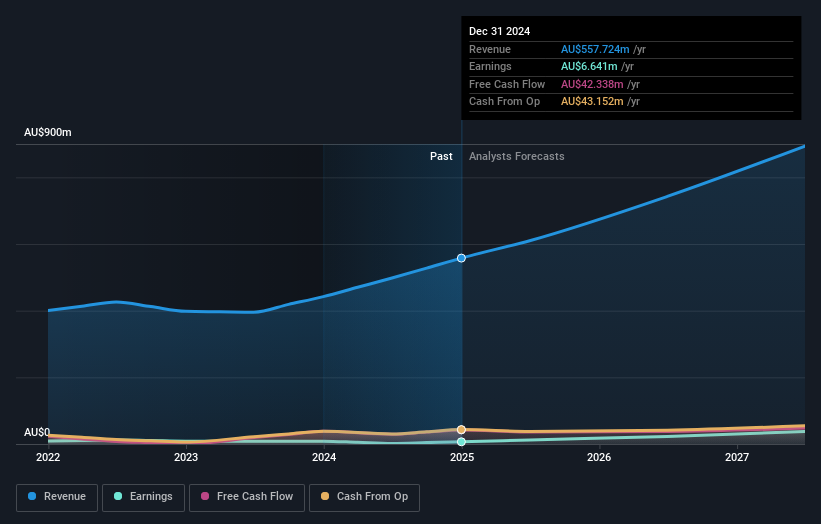- Australia
- /
- Specialty Stores
- /
- ASX:TPW
Institutional investors are Temple & Webster Group Ltd's (ASX:TPW) biggest bettors and were rewarded after last week's AU$119m market cap gain

Key Insights
- Significantly high institutional ownership implies Temple & Webster Group's stock price is sensitive to their trading actions
- The top 8 shareholders own 52% of the company
- Insiders own 12% of Temple & Webster Group
To get a sense of who is truly in control of Temple & Webster Group Ltd (ASX:TPW), it is important to understand the ownership structure of the business. The group holding the most number of shares in the company, around 41% to be precise, is institutions. Put another way, the group faces the maximum upside potential (or downside risk).
And things are looking up for institutional investors after the company gained AU$119m in market cap last week. The gains from last week would have further boosted the one-year return to shareholders which currently stand at 56%.
Let's take a closer look to see what the different types of shareholders can tell us about Temple & Webster Group.
See our latest analysis for Temple & Webster Group

What Does The Institutional Ownership Tell Us About Temple & Webster Group?
Institutions typically measure themselves against a benchmark when reporting to their own investors, so they often become more enthusiastic about a stock once it's included in a major index. We would expect most companies to have some institutions on the register, especially if they are growing.
Temple & Webster Group already has institutions on the share registry. Indeed, they own a respectable stake in the company. This suggests some credibility amongst professional investors. But we can't rely on that fact alone since institutions make bad investments sometimes, just like everyone does. It is not uncommon to see a big share price drop if two large institutional investors try to sell out of a stock at the same time. So it is worth checking the past earnings trajectory of Temple & Webster Group, (below). Of course, keep in mind that there are other factors to consider, too.

It would appear that 9.1% of Temple & Webster Group shares are controlled by hedge funds. That worth noting, since hedge funds are often quite active investors, who may try to influence management. Many want to see value creation (and a higher share price) in the short term or medium term. Looking at our data, we can see that the largest shareholder is Australian Super Pty Ltd with 12% of shares outstanding. In comparison, the second and third largest shareholders hold about 9.1% and 6.0% of the stock.
We also observed that the top 8 shareholders account for more than half of the share register, with a few smaller shareholders to balance the interests of the larger ones to a certain extent.
While studying institutional ownership for a company can add value to your research, it is also a good practice to research analyst recommendations to get a deeper understand of a stock's expected performance. There are plenty of analysts covering the stock, so it might be worth seeing what they are forecasting, too.
Insider Ownership Of Temple & Webster Group
The definition of an insider can differ slightly between different countries, but members of the board of directors always count. The company management answer to the board and the latter should represent the interests of shareholders. Notably, sometimes top-level managers are on the board themselves.
I generally consider insider ownership to be a good thing. However, on some occasions it makes it more difficult for other shareholders to hold the board accountable for decisions.
It seems insiders own a significant proportion of Temple & Webster Group Ltd. It is very interesting to see that insiders have a meaningful AU$261m stake in this AU$2.1b business. It is good to see this level of investment. You can check here to see if those insiders have been buying recently.
General Public Ownership
With a 32% ownership, the general public, mostly comprising of individual investors, have some degree of sway over Temple & Webster Group. While this group can't necessarily call the shots, it can certainly have a real influence on how the company is run.
Private Company Ownership
We can see that Private Companies own 5.3%, of the shares on issue. It might be worth looking deeper into this. If related parties, such as insiders, have an interest in one of these private companies, that should be disclosed in the annual report. Private companies may also have a strategic interest in the company.
Next Steps:
While it is well worth considering the different groups that own a company, there are other factors that are even more important. Consider for instance, the ever-present spectre of investment risk. We've identified 1 warning sign with Temple & Webster Group , and understanding them should be part of your investment process.
If you would prefer discover what analysts are predicting in terms of future growth, do not miss this free report on analyst forecasts.
NB: Figures in this article are calculated using data from the last twelve months, which refer to the 12-month period ending on the last date of the month the financial statement is dated. This may not be consistent with full year annual report figures.
If you're looking to trade Temple & Webster Group, open an account with the lowest-cost platform trusted by professionals, Interactive Brokers.
With clients in over 200 countries and territories, and access to 160 markets, IBKR lets you trade stocks, options, futures, forex, bonds and funds from a single integrated account.
Enjoy no hidden fees, no account minimums, and FX conversion rates as low as 0.03%, far better than what most brokers offer.
Sponsored ContentValuation is complex, but we're here to simplify it.
Discover if Temple & Webster Group might be undervalued or overvalued with our detailed analysis, featuring fair value estimates, potential risks, dividends, insider trades, and its financial condition.
Access Free AnalysisHave feedback on this article? Concerned about the content? Get in touch with us directly. Alternatively, email editorial-team (at) simplywallst.com.
This article by Simply Wall St is general in nature. We provide commentary based on historical data and analyst forecasts only using an unbiased methodology and our articles are not intended to be financial advice. It does not constitute a recommendation to buy or sell any stock, and does not take account of your objectives, or your financial situation. We aim to bring you long-term focused analysis driven by fundamental data. Note that our analysis may not factor in the latest price-sensitive company announcements or qualitative material. Simply Wall St has no position in any stocks mentioned.
About ASX:TPW
Temple & Webster Group
Engages in the online retail of furniture, homewares, and home improvement products in Australia.
Flawless balance sheet with high growth potential.
Similar Companies
Market Insights
Community Narratives



